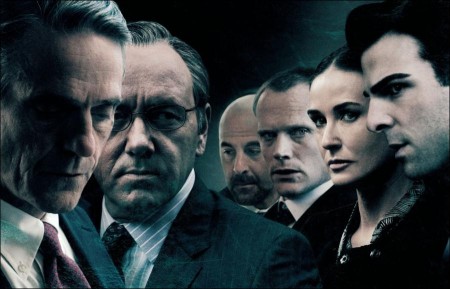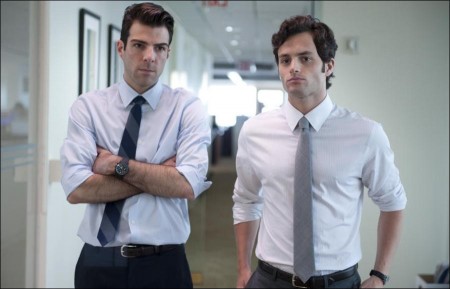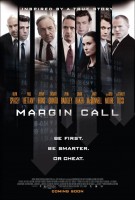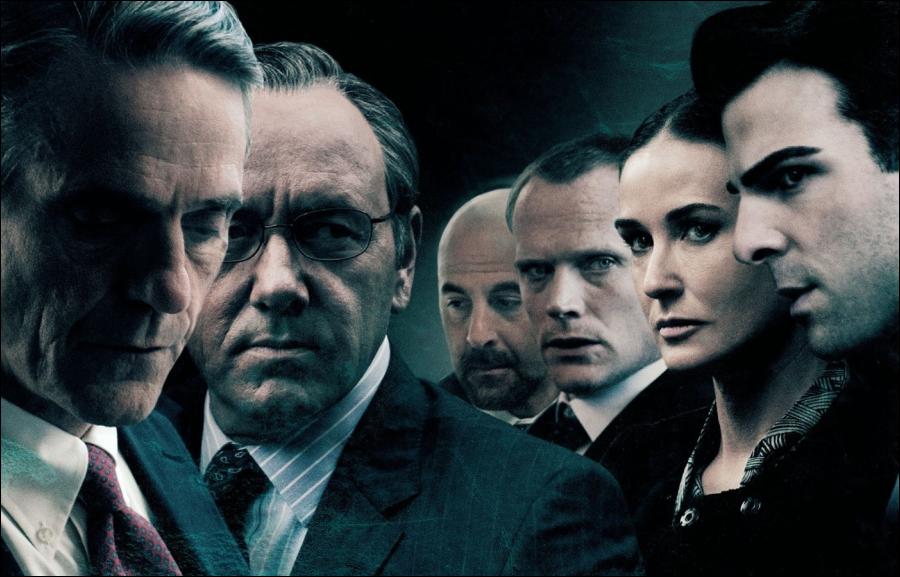Taglines: Be first. Be smarter. Or cheat.
The action takes place over the course of 24 hours at an investment bank, loosely modelled on Lehman Brothers, in the early stages of the crisis in 2008. Into the pit of the trading floor comes a unit of grim-faced female human resources executives to deliver the bad news of lay-offs. One staffer given his marching orders is a senior trader played by Stanley Tucci, an actor with a facility for toggling from effete to macho who displays a dash of both here. As he marches out under escort he hands a data stick to the young analyst Sullivan (Zachary Quinto from Heroes and Star Trek) and tells him to check out his unfinished project. “Be careful,” he mutters as the elevator doors banish him forever from the kingdom.
Sullivan is a rocket scientist who’s gone into finance because it pays better, which doesn’t bode well for the future of Nasa. Nonetheless he plugs in the stick and learns that his former colleague had worked out that the company was so over-leveraged with mortgage-backed securities that everything was about to come crashing down. Things start to escalate as more players get involved and Chandor takes us on a tour of the executive ladder. Sullivan’s boss is a nicely cynical Paul Bettany, who in turn reports to Spacey. We know Spacey’s essentially a good guy because he cries over his ailing dog at the start of the movie.
The ones above Spacey are even greater self-serving monsters and Simon Baker, Demi Moore and the slightly hammy overlord Jeremy Irons do a good job of portraying the moral ambivalence that must have permeated the upper echelons of the financial world at the time, and in all likelihood still does. Irons flies in by chopper to rally the troops and implement the survival plan, leaving Spacey to mull over his position in a highly dubious scheme. Margin Call feels small and drags in places, but it looks good and there’s some great dialogue. With a little trim here and there it could emerge as a neat time capsule of an appalling episode of human behaviour.
About the Production
In the wake of the crisis that rocked the world’s financial markets in 2008, a lot of people asked that same question of the engineers of the disaster. How does a man confront the fact of failure, a failure that might not only cost him his job, but cost millions of people their entire livelihoods? J.C. Chandor’s riveting and deeply-felt thriller Margin Call takes us where no film has taken us before: inside the heart of one of Wall Street’s too-big-to-fail financial titans, a sharply-etched snapshot of a world and a group of people on the brink of collapse.
Unfolding over the course of roughly 24 hours, Margin Call takes us from the moment of dawning suspicion that something is terribly wrong, to the full recognition of the scope of the disaster, to the sifting through the wreckage—both personal and financial—when the final bell rings and the “bloodbath” of trading comes to a close. From junior analysts to CEO titans, every member of the corporate hierarchy must come to grips with the nightmare-come-true, and their own roles in creating it. Rising to the task of bringing this story to life is an all-star ensemble that includes Kevin Spacey, Paul Bettany, Jeremy Irons, Zachary Quinto, Penn Badgley, Simon Baker, Mary McDonnell, Demi Moore, and Stanley Tucci.
While it’s possible to say, without exaggeration, that the financial crisis has affected virtually everyone on the planet, the roots of Margin Call emerge from a highly personal place for firsttime writer/director J.C. Chandor. “I think a lot of people have wondered where I sort of gained a fundamental understanding of this industry, not having worked in it,” he shares. “But my father worked in this business, for Merrill Lynch, for almost 40 years, so I certainly had a fundamental knowledge of the people in this world and most importantly had a strong understanding of what and who they cared most about.”
Chandor consulted with his father and a wide array of financial industry veterans who played an important role in ensuring Margin Call was an authentic representation of the scenarios and personalities that are specific to the financial industry. His father Jeffrey states, “What I think J.C. picked up on are times in my life where I had to frantically hire people during a period of boom, and then fire people, some of whom he knew, during the bad times.”
He continued, “Wall Street is traditionally not a well-managed business, as a business. There are very good traders, very good investment bankers, and very good sales people, but making that work as a business that is profitable year-in and year-out with some consistency is tough. And there aren’t that many firms that are good at it in this business. To put all of these elements into a story so that an average guy-on-the-street can understand and potentially learn about the business is J.C.’s talent. That is what he is good at.”
For actor and producer Zachary Quinto (Star Trek), that personal perspective was crucial to the script’s effectiveness and appeal. “It was just so clear, even before I really got to know J.C., that this story was coming from somewhere very intrinsic in him,” he notes. “It’s just so wonderful to see a creative extension of someone’s experience fall so seamlessly onto a page and be so playable from a perspective of being an actor, it’s really unique.”
That personal relationship to the material gives Chandor a unique level of insight into the inner lives of his characters, turning what might, in other hands, have become an anti-corporate screed into a richly nuanced and ultimately empathetic group portrait. “It’s really a human story at its core,” explains Chandor. “I tried to look at it with a more sympathetic eye on both sides. It’s not like I’m a banker who is defending other bankers, but also knowing a lot of these people, you recognize that it’s not pure evil, either.”
As Quinto elaborates, “one of my favorite things about this screenplay that it doesn’t judge. It’s not written to drag these people through the coals or to hang them by their toes. It’s actually an exploration of the choices people make in their lives and of how much was ultimately out of their control. J.C. understands on a very deep and personal level, and I think there’s a lot of integrity in that.”
Not only is Margin Call the work of a first-time writer/director, but of a trio of young first-time producers as well: Quinto, Neal Dodson and Corey Moosa, who together comprise the principals of Before the Door Pictures. “It was about a year and a half before Star Trek came out,” recalls Quinto, “when Neal and I had our first conversation about this desire I had to take some control over the stories I’m a part of as an actor, and over the stories that are being injected into the mainstream of our industry. Literally from that point to now it has been one of the most rewarding experiences I think I’ll ever have.”
Fortunately, as first time producers, the Before the Door trio had some assistance in getting the film set up. Michael Benaroya and Rob Barnum of Benaroya Pictures are themselves young producers, but having been down the road before on such films as New York, I Love You and The Romantics, were in a position to put the pieces of the financial puzzle in place. “We just felt there were so many different ways we could cast each role… There are so many powerful scenes, it was something that we felt we could definitely pull off at any number of different budgets. I think the iteration we ended up going with was probably the ‘larger’ version, but I think we could have made this movie for a number of different budgets, depending on what cast we got.”
The team is rounded out by producer Joe Jenckes, longtime friend of J.C. who brought the material to Before The Door and was on the ground every day. Veterans Cassian Elwes and Laura Rister were indispensable executive producers, as was Joshua Blum, whose Washington Square Films was the New York home for the film from pre-production through post.
Most first-time filmmakers would consider themselves lucky to land a “name” actor or two. Chandor and his producers enjoy an embarrassment of riches that includes two Oscar-winners, two Oscar nominees, and a generous handful of other familiar faces from Emmy, Golden Globe and BAFTA lists.
The initial attraction was, of course, Chandor’s tight, intelligent, propulsive script. “That’s a pretty rare thing finding a really good script,” confirms Stanley Tucci (The Lovely Bones, The Devil Wears Prada), who plays fired risk analyst Eric Dale. “It’s so intelligently written, so believable—at least from what I know from having friends in this world. The dialogue was real without being self-consciously naturalistic; it has a wonderful rhythm to it and subtle drama. There was nothing heavy-handed about it. It was all the best things that an independent is supposed to be.”
Tucci’s sentiment is joined by Paul Bettany. “It felt like a like David Mamet, but in a good way,” recalls Bettany, chuckling as he clarifies, “Well, that is a good thing. But it didn’t feel like a bad version of Mamet. It felt wordy and fast-paced and exciting, and it felt like it would give me a lot of opportunities as an actor.”
Bettany isn’t alone in singling out that quality of the script, which for all of its vivid language, provides an intimate and unique portrait of its subjects, locating these ordinarily powerful men and women in their moments of greatest vulnerability. Well, that and working with Kevin Spacey, who sits at the center of the film as the deeply conflicted executive Sam Rogers. Virtually every cast member cited the opportunity to work with the two-time Oscar winner as a key reason for signing on to the film, and as an early champion of Margin Call, Spacey is as fundamental a part of the production’s DNA as any of the filmmakers. “I can’t stress enough how the knowledge that Kevin Spacey and Stanley Tucci were in the movie made me jump,” states Bettany. “They’re two actors who I’ve always really wanted to work with”
The younger cast members, Zachary Quinto and Penn Badgley, were among the most appreciative of the ongoing master class that emerged each day on and off the set. “Just listening to Paul Bettany and Kevin Spacey talk about theatre one night,” recalls Badgley, “we were just hanging out and I was listening to them talk… that in it of itself was like a lesson. I found myself thinking about it and applying it, even subconsciously, over the next couple of days. It’s just been an enormous learning experience for me.”
It’s, of course, one thing to attract brilliant actors to your movie, and quite a different thing for a first-time director to coax the performances he needs from that veteran cast. To hear his actors tell the story, J.C. Chandor passed that test with flying colors. “J.C.’s wonderful,” states Stanley Tucci. “He’s very bright. He’s very kind, very self-effacing, he has no problem changing any line that we feel isn’t working or that he feels isn’t working. He’s incredibly spontaneous and yet he’s incredibly organized at the same time.”
Penn Badgley confirms Tucci’s impression: “He’s very much a writer/director, so positive and willing to change things. He’s not married to anything; he’s not worried about somebody else coming in and making it different and making it better. He’s just great with that.”
At the same time, Chandor was vigilant in making certain his vision was brought to the screen faithfully. As Paul Bettany notes, “I think J.C. had the courage to let everybody show him their stuff and not be threatened by perhaps differences of opinion, but also able to be clear when he thinks that you’re wrong. That’s incredibly courageous as a director and writer, if you’ve been living with these characters for so long and then invite other human beings into your piece of work. I’m sure that can be terrifying and he doesn’t ever show that.”
Similarly, the director always stood ready to help his actors with the subtleties of what could sometime be challenging material. Demi Moore (G.I. Jane, A Few Good Men), who plays hard-edged Chief Risk Officer Sarah Robertson, notes that, “given that this is an independent with limited time, where everything has to be done in overdrive, there have been times where he’s been willing to say, ‘let me explain what it is that you’re actually saying, what that language is and what it means.’ And it comes from him in such an easy, natural way because he’s grown up around it and he’s worked with it and he knows it. That absolutely increases your level of trust and level of safety with a first-time director.”
“[The script] has wit, it has suspense, and it has well-rounded characters,” commented Jeremy Irons, who plays the firm’s mysterious and powerful CEO John Tuld. “J.C. is a very generous director, and was very open about not having directed anything previously. But he compensated for that by knowing the subject so well. He’s able to fill you in on the characters and the way they should behave because he lived through all of this himself. He has tremendous experience in this world.”
Margin Call takes place largely within the same few offices and conference rooms of one office space. Not only did that limited setting keep the budget manageable, it paid dividends in terms of the camaraderie among the cast and crew. “I’ll tell you what is unique to this particular experience that I’ve never had,” shares Demi Moore. “Everything is taking place on this one floor of this office building—we’re our own little mini studio in the sky. There’s something very intimate in that; maybe you find it more in theatre, where everyone is in the same place, and we can just walk across the hall to where someone else’s dressing room is. It’s very different than everybody just going off to their trailers, or moving place to place.”
But despite the film’s enclosure in its office suites, the locale is very much a part of the film. “You always see New York out of the back of every shot,” notes Paul Bettany, “and it’s stunning. It’s kind of cliché to say it, but it’s so photogenic as a city… it’s something to do with the golden mean, the width of the canyons and the height of the buildings… It’s just extraordinary, it has such gravitas and film history. I mean, I live in New York and to see it like this, you get a new appreciation for it.”
That sense of perspective—both cultural and personal—is what sets Margin Call apart from other films that have attempted to come to grips with the crisis and its effect on individuals, families and entire industries around the world. For Penn Badgley, the chance to play a part in it echoes the opportunities his predecessors had to play off of world-changing events. “I think [the financial crisis] probably is the most relevant and will continue to be the most relevant prevailing issue in anyone’s mind for the next long while,” he observes. “So for a young actor right now, it’s almost the equivalent of doing a war film, you know? I think the financial films that are coming out now are going to be romanticized later in cinema.”
For Stanley Tucci, Margin Call represents a similar opportunity to speak to the near-universal experience of watching current events spiral out of control. “The thing about the script that I think brought everyone here was its intelligence and its truthful probing into this world, but not in a melodramatic or ‘Hollywood’ way. It works in a very simple and straightforward way, a human way. It humanizes all these events that really are abstractions to so many of us, but they didn’t become abstract once these companies started to fall apart. The whole country suffered— the little guy suffered and the middle guy suffered and the rich guy suffered, everybody suffered. Everyone feels the repercussions of the damage that they inflicted. So I think that part of it, for me, is not only wanting to have a better understanding of what happened, but also wanting to be a part of telling that story.”
Margin Call
Directed by: J.C. Chandor
Starring: Zachary Quinto, Demi Moore, Kevin Spacey, Carla Gugino, Stanley Tucci, Paul Bettany, Jeremy Irons
Screenplay by: J.C. Chandor
Production Design by: John Paino
Cinematography by: Frank G. DeMarco
Film Editing by: Pete Beaudreau
Costume Design by: Caroline Duncan
Set Decoration by: Robert Covelman
Music by: Nathan Larson
MPAA Rating: R for language.
Studio: Lionsgate Films
Release Date: October 21, 2011
Hits: 104








